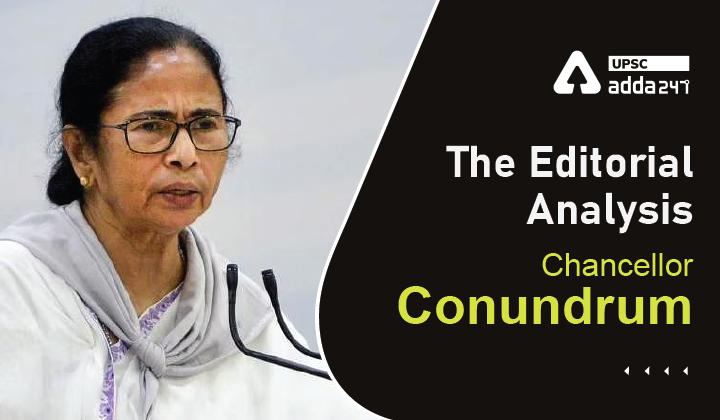Table of Contents
Chancellor Conundrum- Relevance for UPSC Exam
- GS Paper 2: Federalism- Functions and responsibilities of the Union and the States, Issues and challenges pertaining to the federal structure.
Chancellor Conundrum
- Recently, the West Bengal government took a decision to make the Chief Minister the Chancellor of State-run universities, instead of the Governor of the State.

Strained Relationship between Governor and WB government
- The decision of West Bengal Government appears to be an outcome of the severely strained relations between Governor Jagdeep Dhankhar and Chief Minister Mamata Banerjee.
- They have often differed on issues concerning the appointment of Vice-Chancellors and the functioning of universities.
- Governor’s Allegation: He had alleged that VCs were appointed without the approval of the Chancellor, the appointing authority.
- On some occasions, VCs had not turned up for a meeting with the Governor-Chancellor.
Office of Governor: Issues and Suggestions
Friction in Other States
- Tamil Nadu: Tamil Nadu recently passed Bills to empower the State government, instead of the Chancellor, to appoint VCs.
- It also passed a separate Bill to establish a new university for alternative systems of medicine with the Chief Minister as its Chancellor.
- However, the Bills are yet to receive the Governor’s assent.
- Kerala: In Kerala, there is a different kind of controversy, with Governor Arif Mohammed Khan asking the Chief Minister to take over the Chancellor’s role in the light of alleged political interference in the functioning of universities.
Reason for the Friction
- Statutory Role of Governor: Above developments underscore that the conferment of statutory roles to Governors may be a source of friction between elected regimes and Governors who are seen as agents of the Centre.
- The original intent of making Governors hold the office of Chancellor and vesting some statutory powers on them was to insulate universities from political influence.
The Upcoming Crisis in Indian Federalism
Sarkaria Commission Report
- It acknowledged the distinction between the Governor’s constitutional role and the statutory role performed as a Chancellor.
- It also underlined that the Chancellor is not obliged to seek the government’s advice. However, it did say there was an obvious advantage in the Governor consulting the Chief Minister or the Minister concerned.
Punchhi Commission Report
- The commission noted that the Governor should not be “burdened with positions and powers which may expose the office to controversies or public criticism”.
- it advised against conferring statutory powers on the Governor.
- It felt that the practice of making the Governor the Chancellor of universities ceased to have relevance. The Punchhi Commission said that-
- Ministers will naturally be interested in regulating university education, and there is no need to perpetuate a situation where there would be a clash of functions and powers.
Conclusion
- The time may have come for all States to reconsider having the Governor as the Chancellor.
- However, they should also find alternative means of protecting university autonomy so that ruling parties do not exercise undue influence on the functioning of universities.
Office of Governor: Issues and Suggestions




 TSPSC Group 1 Question Paper 2024, Downl...
TSPSC Group 1 Question Paper 2024, Downl...
 TSPSC Group 1 Answer key 2024 Out, Downl...
TSPSC Group 1 Answer key 2024 Out, Downl...
 UPSC Prelims 2024 Question Paper, Downlo...
UPSC Prelims 2024 Question Paper, Downlo...
